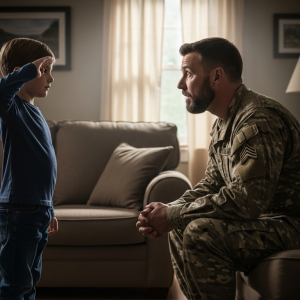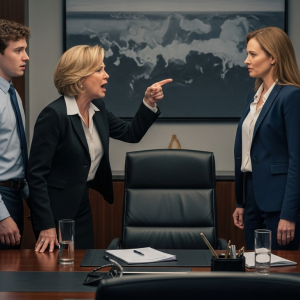The phone buzzed on the kitchen counter, a jarring sound that sliced through the quiet morning. Clara, her hands submerged in soapy water, glanced at the caller ID: Northwood Elementary. A familiar knot of dread tightened in her stomach. It was never good news.
“This is Clara,” she answered, her voice betraying a slight tremor. Sam had been so quiet lately, a shadow of the bright, chatty boy he once was. His laughter, once the constant soundtrack of their home, had become a rarity.
“Mrs. Miller, this is Sarah Albright, Sam’s teacher.” The voice on the other end was calm, but with an undercurrent of urgency that did little to soothe Clara’s nerves. “I was hoping you could come in. There’s something we need to discuss regarding Sam. It’s… a sensitive matter.”
“Is he okay? Was he hurt?” Clara’s mind immediately leaped to scraped knees and playground fights, the typical dramas of an eight-year-old’s life. She pictured a cartoonish bully, a bigger kid with a mean streak.
“He’s physically fine,” Ms. Albright assured her, though the clarification was not as comforting as intended. “But I think it would be best if we spoke in person. As soon as you are able.” The finality in her tone left no room for negotiation.
Twenty minutes later, Clara was pulling into the school’s visitor parking, her heart pounding a frantic rhythm against her ribs. She thought of Sam that morning, how he had picked at his breakfast, his gaze lost somewhere in the patterns of the tablecloth. He’d complained of another stomachache, a recurring ailment that the doctor could find no cause for.
At home, her husband David had been dismissive. “He needs to toughen up, Clara. That’s just the world. You can’t shield him forever. Boys will be boys.” He had ruffled Sam’s hair, a gesture that was meant to be affectionate but felt more like a dismissal. “Be a champ today, Sammy,” he’d said, his voice layered with a meaning Clara was only just beginning to resent.
She walked through the school’s cheerful, brightly colored hallways, the sound of distant children’s laughter a stark contrast to her own grim mood. Ms. Albright met her at the door to her classroom, her expression grave. She was a young teacher, but her eyes held a wisdom and concern that seemed beyond her years.
“Thank you for coming so quickly, Mrs. Miller.” She didn’t lead Clara to her desk, surrounded by student artwork and gold-star charts. Instead, she guided her to an adjacent, empty classroom, the silence within its four walls feeling heavy and ominous.
Ms. Albright closed the door, the click of the latch echoing in the stillness. “Please, have a seat. What I have to say might be difficult to hear.”
“It’s about Ethan, isn’t it?” Clara ventured, recalling Sam mentioning the name in a hushed, fearful whisper once or twice. “Sam said he’s been mean to him.”
“It’s about Ethan,” Ms. Albright confirmed, her gaze unwavering. “But it’s more than just being mean. The bullying… it’s not physical. It’s methodical. Cruel. It’s targeted in a way that’s deeply disturbing.” She leaned forward, her voice dropping to a near-whisper.
“I don’t think Ethan is the one who came up with it,” she said, each word landing like a stone in the quiet room. “I think he’s just a puppet. Someone else is pulling the strings.”
A cold dread, far worse than her earlier anxiety, began to seep into Clara’s bones. This was no longer a simple case of a playground bully. This was something else entirely. Something calculated.
Ms. Albright explained. “I had to confiscate Ethan’s phone yesterday. He was causing a disruption. Later, I noticed he kept listening to something on it, a recording, over and over. He wasn’t just listening; he was studying it. Like an actor learning his lines.”
The teacher hesitated, pulling out her own phone and placing it on the small table between them. “I know this is a breach of protocol, but my conscience wouldn’t let me ignore it. I copied the audio file. I need you to listen.”
Clara stared at the phone as if it were a venomous snake. Her breath caught in her throat. Ms. Albright pressed play.
A man’s voice filled the room. It was clear, confident, and utterly devoid of warmth. It was a voice of command. “Alright, here’s the plan for tomorrow,” it began. Clara didn’t recognize it at first. It was just a stranger, a voice in a box.
Then, the instructions began, and the world tilted on its axis.
“Start with the drawing. Tell him it looks like something a baby would do. Ask him if he’s ever going to do anything that isn’t… soft.”
Clara’s hand flew to her mouth. Sam loved to draw. He spent hours creating elaborate fantasy worlds on paper, his only escape lately. David often made comments, veiled as fatherly advice. “Still drawing those things, Sammy? You should be outside, playing ball.”
The recorded voice continued, each word a precisely aimed dart. “Then you’re going to talk about Brave Bear. Ask him if he still needs his teddy bear to save him from the monsters. Make sure other kids can hear you.”
Brave Bear. The worn-out stuffed animal from Sam’s toddler years. He had recently dug it out of a box in the attic, a silent regression into a safer past. No one was supposed to know about that. No one but her… and David.

Clara felt the air leave her lungs. A roaring sound filled her ears, but she could still hear the voice from the phone, a cruel phantom in the silent room.
“And then, if he looks like he’s going to cry, you remind him about the tree. The one he fell out of. You tell him he still cries just like a little girl.”
The memory slammed into her with the force of a physical blow. Last summer, in their own backyard. Sam had fallen from the low branch of the old oak. He had been terrified, his arm twisted at an odd angle. David had been there. Only David and her. David had been the one to say, “Stop crying, Sammy. Boys don’t cry.”
The final piece of the puzzle, the one that shattered her world completely, came at the very end of the recording. The man’s voice, laced with a smug sense of accomplishment, delivered the closing line.
“Do a good job, champ. You ‘toughen him up’ for me.”
Champ.
It was David’s nickname for Sam. A word he used like a weapon, coated in sarcasm and disappointment. The voice on the recording wasn’t a stranger. It was the voice of her husband. The father of her child.
The roaring in Clara’s ears subsided, replaced by a terrifying, crystalline silence. The shock was so profound, it was almost peaceful. It was the calm at the center of a hurricane. Then, the calm broke, and a cold, hard fury began to build in its place. It was an anger so pure and absolute it felt like steel solidifying in her veins.
She looked at Ms. Albright, whose face was a mixture of pity and resolve. In that moment, Clara saw not just a teacher, but an ally. She knew David. She knew how he would twist this, how he would deny everything, gaslight her, call her hysterical, turn it all back on her. A direct confrontation would be useless. He had to be exposed.
“He’ll deny it,” Clara said, her own voice sounding foreign to her, stripped of all emotion. “He’ll say I’m crazy.”
“I know,” Ms. Albright replied, her eyes meeting Clara’s. “That’s why we can’t confront him. We have to trap him.”
And there, in the quiet of the empty classroom, the two women began to forge a plan. A parent-teacher conference. But not just any conference. A summit. Clara and David. Ethan and his parents. Ms. Albright and the school principal. David would walk into that room expecting to play the part of the concerned, model father. He would have no idea he was walking onto a stage where his own curated performance would be his public execution.
The days leading up to the meeting were a masterclass in deception. Clara moved through her home like a ghost, her conversations with David a carefully constructed facade of normalcy. She discussed groceries, paid bills, and feigned interest in his day, all while a silent scream echoed in the chambers of her heart.
Every interaction was now filtered through the horrifying lens of her new knowledge. When David would critique Sam’s drawing with a casual, “You should use stronger lines, son,” Clara heard the voice from the recording, coaching Ethan on how to mock her child’s art.
When Sam had a nightmare and crept into their room, clutching Brave Bear, David had sighed heavily. “For God’s sake, Clara, he’s eight years old. This is what your coddling does.” Clara saw not a concerned father, but a predator, observing the effects of his psychological poison. The memory she had long dismissed, of David hiding Sam’s favorite toy to “teach him about loss,” now felt less like a foolish prank and more like an early experiment in cruelty.
The day of the meeting arrived, grey and overcast, a perfect mirror of Clara’s soul. She sat in the sterile, airless conference room at a long table. Ms. Albright sat beside her, a calm and steady presence. The principal, Mr. Harrison, a stern man with a reputation for no-nonsense, sat at the head of the table. Across from them sat Ethan’s parents, the Masons, looking defensive and bewildered.
And then David walked in. He was the picture of paternal concern, his brow furrowed, his suit immaculate. He shook Mr. Harrison’s hand firmly, gave a sympathetic nod to the Masons, and sat beside Clara, placing a hand on her back in a show of support that made her skin crawl.
“Thank you all for being here,” Mr. Harrison began, his tone formal. “We’re here to discuss a serious pattern of psychological bullying involving Ethan Mason and Sam Miller.”
The Masons immediately went on the defensive. “Our Ethan is a good boy,” Mrs. Mason insisted. “He’s just fallen in with a bad crowd. He’s impressionable.”
David leaned forward, assuming the role of the wise mediator. “I understand completely,” he said, his voice smooth and reasonable. “Boys this age are trying to figure out their place in the hierarchy. I’ve actually been mentoring some of the more… troubled kids in the neighborhood. Like Ethan. Trying to give them a positive male role model. To build their character.”
He looked around the table, his expression one of earnest concern. “Sometimes, that involves a bit of tough love. To prepare them for the harsh realities of the world. We can’t raise them to be soft.”
Clara felt a wave of nausea. He was using his own twisted philosophy as his defense, painting himself as a community hero. He was confessing without even knowing it.
The principal listened patiently, his face unreadable. Ms. Albright detailed the specific, cruel phrases Ethan had used, and how they had systematically dismantled Sam’s confidence. Mr. and Mrs. Mason grew paler with each revelation.
Finally, after everyone had spoken, Mr. Harrison turned to Clara. “Mrs. Miller, do you have anything to add?”
The room fell silent. David gave her hand a squeeze under the table, a gesture of encouragement. It took every ounce of her self-control not to recoil.
Clara took a slow, deep breath. She looked directly at Ethan’s parents, then at the principal, before letting her gaze land on her husband.
“I do,” she said, her voice steady and cold. “I think we’ve heard a lot of theories about Ethan’s motivations. But I think it would be more productive to hear from Ethan’s actual coach.”
A flicker of confusion crossed David’s face. Before he could process her words, Clara placed her phone on the polished surface of the table. The silence was absolute as she pressed play.
The recording began. David’s confident, commanding voice filled the small room, stripped of its public charm, raw and conspiratorial.
“Alright, here’s the plan for tomorrow. Start with the drawing…”
Clara watched as the blood drained from David’s face. His mask of composure didn’t just crack; it shattered. His eyes darted around the room, searching for an escape, but he was trapped by the sound of his own voice, methodically detailing his campaign of psychological torture against his own son.
When the recording reached the part about Brave Bear, Mrs. Mason let out a horrified gasp, her hand flying to her mouth. Mr. Harrison’s face had become a thundercloud.
The final words hung in the air like a death sentence. “Do a good job, champ. You ‘toughen him up’ for me.”
The recording ended. The ensuing silence was more damning than any shout. It was thick with disgust and disbelief. Mrs. Mason was openly weeping, looking from the phone to David with utter horror, realizing her son had been nothing more than a weapon in this man’s sick game.
David opened his mouth, but no sound came out. The perfect facade was gone, and in its place was a panicked, cornered animal. The community pillar, the mentor, the perfect father, had been exposed as a monster in front of the very people whose admiration he craved. His public life was over.
The destruction was swift and total. It was not a single, explosive event, but a series of controlled demolitions that razed David’s carefully constructed world to the ground.
Socially and legally, the fallout was immediate. The principal issued a formal notice banning David from school grounds, effective immediately. The story, in its horrifying detail, spread through the tight-knit community with the speed of a wildfire. The Masons, furious at how their son had been manipulated, were not discreet. David, the man who prided himself on his reputation, became a pariah overnight. Friends stopped calling. Neighbors crossed the street to avoid him.
Clara filed for divorce the very next day. She was relentless. The audio recording was undeniable proof of extreme psychological abuse. Her lawyer presented it not as a criminal matter, but as a definitive statement on his character and fitness as a parent. The judge agreed. Clara was granted full custody of Sam, the family home, and a restraining order that legally enforced the distance David had already created emotionally. His attempt to control his son had cost him all access to him.
But the most profound punishment was not legal or social. It was psychological. David was a classic narcissist; his entire sense of self was built on the twin pillars of public admiration and private control. Clara had methodically kicked both out from under him.
He was left utterly alone, a king in a kingdom of one. The wife he saw as a soft-hearted accessory had proven to be a formidable adversary. The community he sought to impress now looked at him with contempt.
The ultimate irony, the cruelest twist of the knife, was Sam. With David gone, and with the help of a gentle, patient therapist, the light slowly returned to Sam’s eyes. He began to draw again, not with hesitation, but with a renewed passion. His fantasy worlds became more vibrant, his lines more confident.
His sensitivity, the very quality David had tried to extinguish, became his greatest strength. It made him a compassionate friend. It made him a talented young artist. He was healing, thriving, becoming exactly the person he was meant to be, not the hardened, hollow version his father had tried to forge.
David’s greatest fear was having a “weak” son. But now, the sight of Sam’s happiness, of his resilience, became David’s perpetual torment. Sam’s success was a constant, living monument to David’s failure. He hadn’t toughened his son; he had only revealed his own profound weakness, his own crippling insecurity. He was left alone in the wreckage of his life, haunted by the echoes of his own toxicity, a ruler with no one left to rule.




